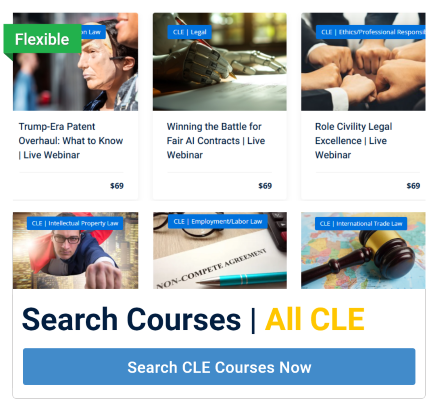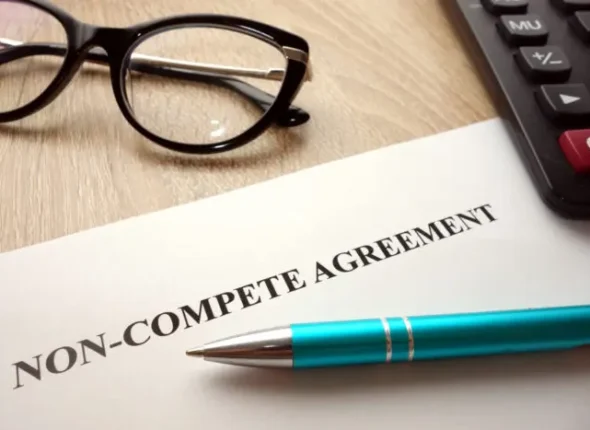Vermont CLE | Choose Your Plan | Search for a Course

Vermont MCLE Requirements:
Attorneys in Vermont must complete 24 hours of VT MCLE (Mandatory Continuing Legal Education) every two years, including at least 2 hours of legal ethics and 1 hour of attorney wellness. These credits can be earned through Vermont Supreme Court–approved live seminars, webinars, or on-demand courses, offering flexibility to fit busy schedules. Attorneys are required to report their compliance by June 30 of their reporting year, and failure to meet VT MCLE requirements may result in fines or administrative suspension. Click Here for the Detailed VT CLE Article | Click here to Visit the VT MCLE Board.
How to Obtain CLE Credit for a Knowledge Group Course in Vermont:
To earn CLE credit with The Knowledge Group, complete the video courses, answer the secret word questions, and download your Certificate of Attendance. The Knowledge Group is an accredited sponsor of CLE courses in Vermont. This course is presumptively approved.
Attendance Reporting Procedure: Attorneys are responsible for keeping track of their own CLE credits. Certify your attendance as you would normally do directly to your state’s MCLE administrator.
Additional Resources: The Knowledge Group Comprehensive CLE Rules Page or contact CLE support.
Vermont CLE | Search for Single Courses
Winning the Battle for Fair AI Contracts | Live CLE Webinar
Jennifer N. Elleman Partner | Thompson Hine LLP Julie D. Honor Counsel...
Role Civility Legal Excellence | Live Webinar
Grant E. Mulkey Of Counsel | Stinson LLP Navigating Tensions: The Role...
Superman, Copyright, IP | Live CLE Intellectual Property Law Webinar
Josh Berlinsky, Esq. Senior Partner | Darrow Everett LLP Superman, Copyright, and...
Non-Compete Agreements After the FTC Ruling | Live CLE Employment Law Webinar
James Gale Co-Chair, Intellectual Property Litigation | Cozen O’Connor U.S. Non-Compete Agreements...
Russia Sanctions Now: What Changed & What To Do | Live CLE International Trade Law Webinar
Aleksey Shtivelman Partner | Shutts & Bowen LLP Russia Sanctions Now: What...
Mental Health and Substance Abuse in Law | Live CLE Webinar
Jodi Debbrecht Switalski Founder and Chief Consultant | Switalski Law, PLLC Elizabeth...
Ethical Frontier: AI in Legal Practice | Live CLE Ethics Webinar
David V. Sanker, Ph.D. Founder | Sanker IP Kellen M. Shearin Associate...
Opportunity Zones | On-Demand CLE/CPE Tax Webinar
Bradford S. Cohen Partner | Jeffer Mangels Butler & Mitchell LLP Alex...
Preparation to Verdict | Live Webinar
James Turken Partner | Norton Rose Fulbright US LLP Jessica P. Butkera...
Understanding VT CLE Requirements for Attorneys: A Complete Guide
Attorneys practicing in Vermont must maintain their professional knowledge and ethical standards through VT CLE—Vermont’s Continuing Legal Education program. This system ensures lawyers remain competent, ethical, and up to date with evolving laws and legal practices. For both new and experienced attorneys, understanding VT CLE requirements is essential to maintaining an active license and avoiding compliance issues or penalties.
VT CLE Requirements for Vermont Attorneys
The Vermont Judiciary Board of Continuing Legal Education requires all active attorneys to complete 24 hours of VT CLE every two years. These hours are designed to promote professional development and include specific sub-requirements:
• 2 hours of Legal Ethics
• 1 hour of Diversity and Inclusion Education
• 21 hours of general credit, which may include substantive law or practice management topics
Attorneys engaged in litigation or specialized practice areas may also focus on courses that strengthen trial advocacy, negotiation, or client communication skills. This structured approach ensures that VT CLE covers both professional competence and ethical standards, helping attorneys maintain excellence in legal practice across Vermont.
How to Complete VT CLE Credits
Attorneys can fulfill their VT CLE requirements through multiple approved learning formats. Traditional in-person seminars remain a great way to engage with peers and gain real-time feedback, while online and on-demand programs provide flexibility for attorneys with demanding schedules.
Approved formats for VT CLE include:
• Live Webinars and Virtual Seminars – Attend live sessions remotely and interact with presenters.
• On-Demand and Self-Study Programs – Complete courses at your own pace and convenience.
• Hybrid Programs – Combine in-person and online participation for flexibility.
It is essential to ensure that courses are accredited by the Vermont Judiciary Board of Continuing Legal Education. Only approved programs count toward VT CLE hours, so attorneys should verify accreditation before registering. Attorneys are encouraged to maintain their CLE records and track completed credits throughout the reporting period to ensure compliance.
VT CLE Reporting and Deadlines
Reporting VT CLE completion is a straightforward but essential process. Attorneys must complete their required hours by June 30 of their reporting year and certify compliance to the Vermont Judiciary by July 15. The Board provides an online portal for reporting and tracking CLE credits, simplifying the process for busy practitioners.
Failure to complete or accurately report VT CLE hours may result in administrative penalties, late fees, or suspension from practice. Attorneys should retain proof of course completion, including certificates and attendance logs, for at least three years in case of audit. While many providers report attendance directly to the Board, the responsibility for accurate and timely reporting ultimately lies with each attorney.
Value of VT CLE
Beyond compliance, VT CLE provides opportunities for meaningful professional growth. Attorneys can tailor their continuing education to match their practice areas, emerging legal developments, or new areas of interest, ensuring they remain effective and competitive in the legal field.
For example:
• Corporate attorneys may explore contracts, business ethics, and corporate governance.
• Family law practitioners can study mediation, custody law, and evolving case precedents.
• Litigators may refine trial strategy, evidence presentation, and courtroom communication skills.
Ethics and professionalism courses under VT CLE reinforce principles such as confidentiality, integrity, and civility in practice. Meanwhile, diversity and inclusion training fosters greater understanding and fairness within the legal community. By actively engaging in VT CLE, attorneys strengthen both their professional competence and ethical awareness, ultimately benefiting their clients and the justice system.
Conclusion | VT CLE
In conclusion, VT CLE is more than a regulatory obligation—it is a foundation for lifelong learning and ethical excellence in Vermont’s legal profession. By completing accredited courses, maintaining accurate records, and adhering to reporting deadlines, attorneys can stay compliant while continuously improving their knowledge and professional skills.
Through VT CLE, Vermont attorneys demonstrate a steadfast commitment to professionalism, competence, and client service—ensuring the state’s legal community continues to uphold the highest standards of integrity and public trust.
For the latest official VT CLE details, forms, and FAQs, attorneys should visit the Vermont State Unified Court System’s CLE Board website.












